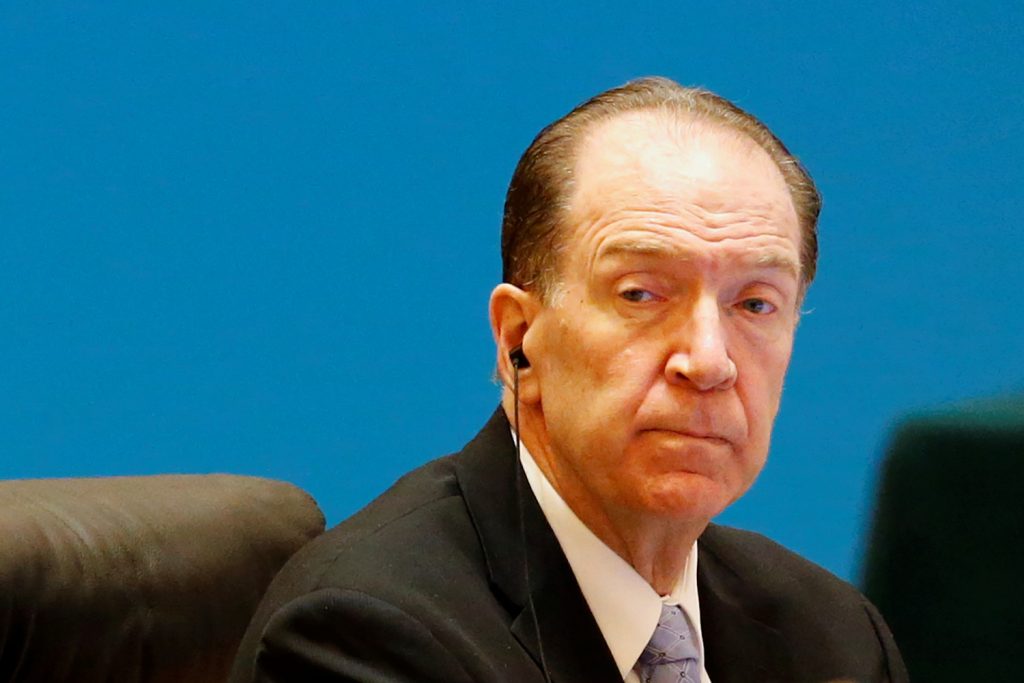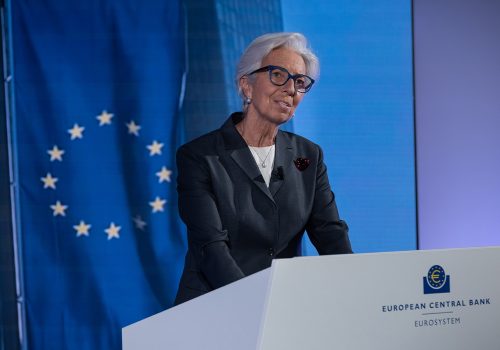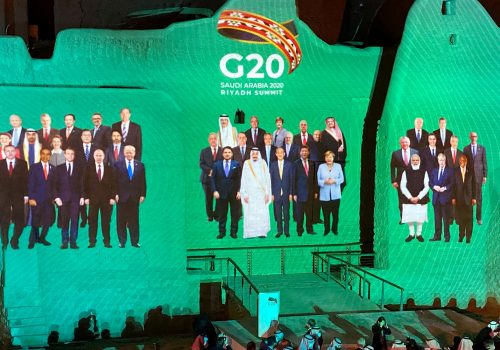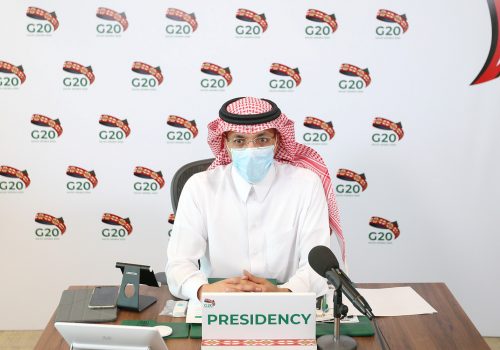China’s fourteenth five-year plan has set its aims high: achieving a majority middle-class country, through income redistribution, reducing economic inequality, and property reform and ownership. But China’s drive to reform its economy “means that China needs to also then have a different relationship with the rest of the world,” according to World Bank President David Malpass.
Malpass shared his insights with Zhu Min, chairman of the National Institute of Financial Research of Tsinghua University, Tom Orlik, chief economist at Bloomberg Economics, and moderator Eunice Yoon, CNBC Beijing’s Bureau Chief at a December 9 event hosted by the Atlantic Council’s GeoEconomics Center and the Paulson Institute’s MacroPolo in Chicago. One of the early tests of China’s ability to change its behavior on the international scene will be in the aftermath of the coronavirus pandemic, Malpass warned. As one of the world’s most important global lenders, China has committed to the Group of Twenty (G20)’s framework to provide debt relief to hard-hit countries, but it needs to follow through on these promises, the Word Bank president argued. Min added that the financial crisis that has sprung from COVID-19 will require a collaborative response from the United States and China, rather than deeper competition.
Here’s a quick look what Malpass, Min, and Orlik said about China’s new role in the world economy and how US-China economic competition can become cooperation.
Counting down to China’s new global role
- Beijing’s new role: One of China’s implicit goals in their fourteenth five-year plan, Malpass explained, is redirecting investment from export industries to the domestic consumer economy, which will require “more movement of people, movement of skills, and movement of capital,” he argued. Beijing’s attempts to restructure its economy “has implications for how China interacts with the rest of the world,” he added. China’s relationship with the World Bank has already evolved as the country has risen out of poverty: it has gone from being “a heavy borrower” from the World Bank, he explained, to a borrower, a donor, and “the third largest [shareholder] in the World Bank.”
- China should do more: While China has lent substantially to emerging economies, Malpass fears that Beijing isn’t doing enough to “reduce that debt, one-by-one, as the countries run into obstacles” from the pandemic, while continuing to charge very high interest rates. But Min argued that “we have to recognize that China is still a low-income country” and that it should be commended for the development finance it provides because it is “a real contribution to global development.” He praised China for joining the Group of Twenty’s common framework and Debt Service Suspension Initiative.
- A jack of all trades?: While some of China’s bilateral lending has drawn criticism from the West, Min argued that working bilaterally is “more effective” because it allows China to sit down with another country to understand their specific needs and challenges. Min added that China is certainly exploring multilateral approaches as well.
- Clarity in crisis: Malpass agreed that China was increasing its multilateral involvement, but he also noted that challenges will arise from China’s new participation. He warned that, especially in capital markets, there remains a “transparency gap” in which “China operates under different standards than the rest of the world.” He adds that borrowing countries deserve more transparency about the interest rates that are being charged, how to restructure debt, and whether lending entities are banks or policy banks with development-related aims. “I think progress is being made in many parts of the world, but not nearly enough.”
Watch the full event
US-China collaboration is “urgent”
- A crisis that demands cooperation: Despite growing economic and strategic competition between China and the United States, Min indicated that “there’s an urgency for both sides to work together” as the economic crisis evolves. Although the beginning of the pandemic brought a financial crisis, now “we are in the second phase of a crisis which is a solvency crisis…We are facing so many challenges,” he said. Min pointed out that during former President Barack Obama’s administration, the United States talked much more frequently with China, whereas President Donald J. Trump had cut down its engagement. “Put the economic issues back at the top and start to talk,” Min suggested.
- Now is the opportunity for reset: As President-elect Joe Biden’s administration takes the reins, Orlik argued that “there is obviously a chance for reset in US-China relations.” In fact, he added, there is a win-win opportunity for the US financial sector, which can capitalize on “all of its deep expertise” to expand its presence in China, which needs more efficient credit allocation.
- Time for a rethink of China’s economy: But there’s a stumbling block to closer US-Chinese cooperation, Orlik said: there is “a lack of realism in the Western view of the Chinese economy” that paints it as “weak and inefficient.” Orlik warns that this assumption causes Western countries to neglect the strongest parts of China’s economy which continue to drive the country’s growth—even in the midst of tariffs, sanctions, and the pandemic. Malpass added that “the West needs to update and be aware of the realities of China,” especially as China’s economy has changed so rapidly—specifically, its income per capita. “Many parts of China would [already] be characterized as advanced,” like living standards, wages, and technology use, he noted, adding that China’s economic evolution will be an indicator for the challenges—and opportunities—that lie ahead in cultivating a constructive relationship between China and the rest of the world.
- A change in model: Orlik noted that the pandemic has changed the way some in China view different economic models. While many wanted the country to adopt a more open capitalist system after the Global Financial Crisis, China’s strong recovery following the pandemic is convincing Chinese leadership that they don’t “need an economy which is more like the American economy,” said Orlik. As the dust settles from the latest crisis, China may be more willing to stake out its own economic place in the world, rather than slowly moving towards Western capitalism.
Katherine Walla is assistant director of editorial at the Atlantic Council
Further reading
Image: World Bank President David Malpass in Beijing, China November 21, 2019. REUTERS/Florence Lo



